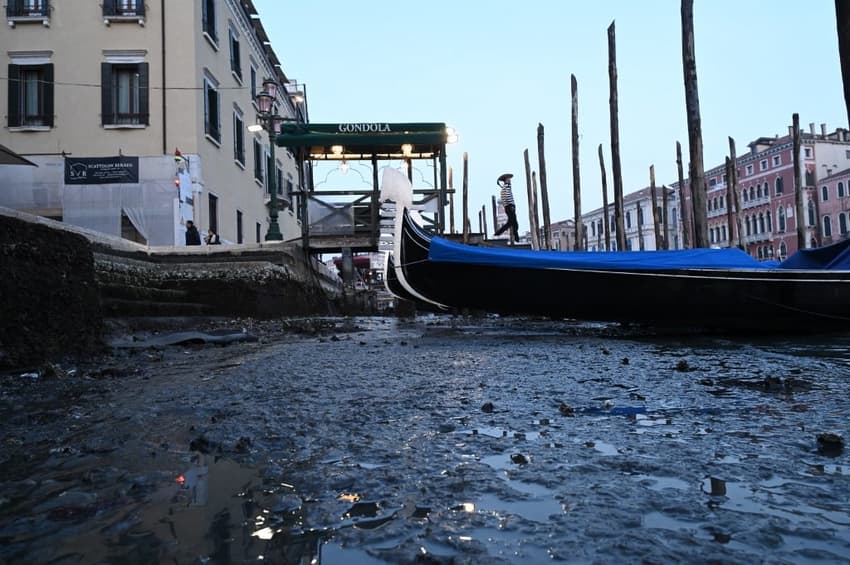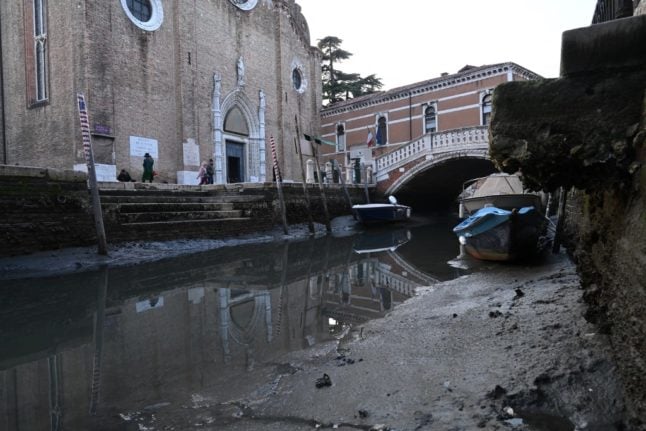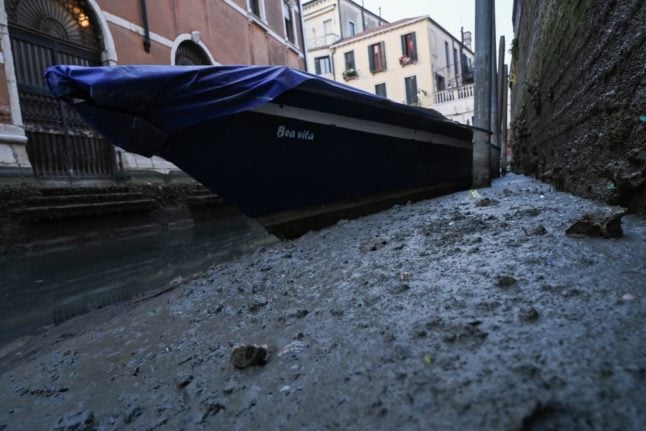FACT CHECK: Are Venice canals really going dry because of the drought?

Venice’s famous canals are suffering from a lack of water, but how unusual is this and does it really have anything to do with the drought hitting northern Italy?
Pictures of dried-up canals and traditional boats hopelessly stranded in the mud have featured in international news reports recently as Venice continues to experience one of the longest low-tide events in its recent history.
READ ALSO: Why Italy is braced for another major drought this spring
And, while focusing on how the low tide is affecting local transport and emergency services, some news reports suggest the drought that’s currently hitting the north of Italy is the main cause of the phenomenon.
Italy has experienced exceptionally dry weather over the past few weeks – the Alps have received less than half of their normal snowfall so far.
But is this why Venice’s canals are drying out?
While northern Italy’s drought might have reduced the amount of fresh water entering the lagoon via nearby rivers, experts say this has little to no bearing on Venice’s currently dried-up landscape.
“The drought has nothing to do with it,” because “rainfall doesn’t affect tide levels,” Georg Umgiesser, a marine researcher at Italy’s National Research Council (CNR), told weather website MeteoWeb on Tuesday.

The drought has no bearing on Venice’s currently dried-up landscape. Photo by Marco SABADIN / AFP
As with all tidal events across the world, Venice’s famous tides are influenced by four main factors: astronomical events (i.e., the Earth’s rotation and the gravitational effects of the sun and the moon), winds and their directions, sea currents and atmospheric pressure.
A “combination of meteorological and astronomical events” is exactly what’s behind Venice’s dry canals, Umgiesser said.
In particular, a spell of high pressure over the Adriatic, along with the new moon phase and the moon being at its nearest possible distance to the Earth on February 18th, all contributed to the city’s low tide, or bassa marea.
So it would be factually wrong to state that northern Italy’s dry weather is at the root of the low tide.
And low tides, which are defined as the city’s water level being 50 or more centimetres below the zero tide gauge (-60, -70, etc.), are far from an anomaly in the (formerly) floating city.
READ ALSO: The three Italian regions hit hardest by the climate crisis

Low tides are far from an anomaly in Venice, especially between late January and early March. Photo by Marco SABADIN / AFP
In fact, although they’ve become significantly less frequent over the past two decades due to rising sea levels, Venice still sees one to ten low tides every year, with most events taking place between early January and late March.
READ ALSO: How climate change left Italy’s ski resorts fighting for survival
Unlike ordinary low tides though, the current event has been going on for days on end now. According to Alvise Papa, who leads Venice’s tide centre (Centro Maree), “it’s the longest stint of low tide in 15 years”.
But Venice’s latest bassa marea could hardly be described as historic. The city has seen 160 low tides with levels equal to or lower than -90cm since 1872, whereas the current tide has ‘only’ reached the -70cm mark so far.
While the rest of the world marvels at pictures of Venice’s dried-up waterways, residents are less impressed as the low tides reportedly limit transport and other public services – a situation which is currently expected to be resolved by the end of the week.
Comments
See Also
Pictures of dried-up canals and traditional boats hopelessly stranded in the mud have featured in international news reports recently as Venice continues to experience one of the longest low-tide events in its recent history.
READ ALSO: Why Italy is braced for another major drought this spring
And, while focusing on how the low tide is affecting local transport and emergency services, some news reports suggest the drought that’s currently hitting the north of Italy is the main cause of the phenomenon.
Italy has experienced exceptionally dry weather over the past few weeks – the Alps have received less than half of their normal snowfall so far.
But is this why Venice’s canals are drying out?
While northern Italy’s drought might have reduced the amount of fresh water entering the lagoon via nearby rivers, experts say this has little to no bearing on Venice’s currently dried-up landscape.
“The drought has nothing to do with it,” because “rainfall doesn’t affect tide levels,” Georg Umgiesser, a marine researcher at Italy’s National Research Council (CNR), told weather website MeteoWeb on Tuesday.

As with all tidal events across the world, Venice’s famous tides are influenced by four main factors: astronomical events (i.e., the Earth’s rotation and the gravitational effects of the sun and the moon), winds and their directions, sea currents and atmospheric pressure.
A “combination of meteorological and astronomical events” is exactly what’s behind Venice’s dry canals, Umgiesser said.
In particular, a spell of high pressure over the Adriatic, along with the new moon phase and the moon being at its nearest possible distance to the Earth on February 18th, all contributed to the city’s low tide, or bassa marea.
So it would be factually wrong to state that northern Italy’s dry weather is at the root of the low tide.
And low tides, which are defined as the city’s water level being 50 or more centimetres below the zero tide gauge (-60, -70, etc.), are far from an anomaly in the (formerly) floating city.
READ ALSO: The three Italian regions hit hardest by the climate crisis

In fact, although they’ve become significantly less frequent over the past two decades due to rising sea levels, Venice still sees one to ten low tides every year, with most events taking place between early January and late March.
READ ALSO: How climate change left Italy’s ski resorts fighting for survival
Unlike ordinary low tides though, the current event has been going on for days on end now. According to Alvise Papa, who leads Venice’s tide centre (Centro Maree), “it’s the longest stint of low tide in 15 years”.
But Venice’s latest bassa marea could hardly be described as historic. The city has seen 160 low tides with levels equal to or lower than -90cm since 1872, whereas the current tide has ‘only’ reached the -70cm mark so far.
While the rest of the world marvels at pictures of Venice’s dried-up waterways, residents are less impressed as the low tides reportedly limit transport and other public services – a situation which is currently expected to be resolved by the end of the week.
Join the conversation in our comments section below. Share your own views and experience and if you have a question or suggestion for our journalists then email us at [email protected].
Please keep comments civil, constructive and on topic – and make sure to read our terms of use before getting involved.
Please log in here to leave a comment.